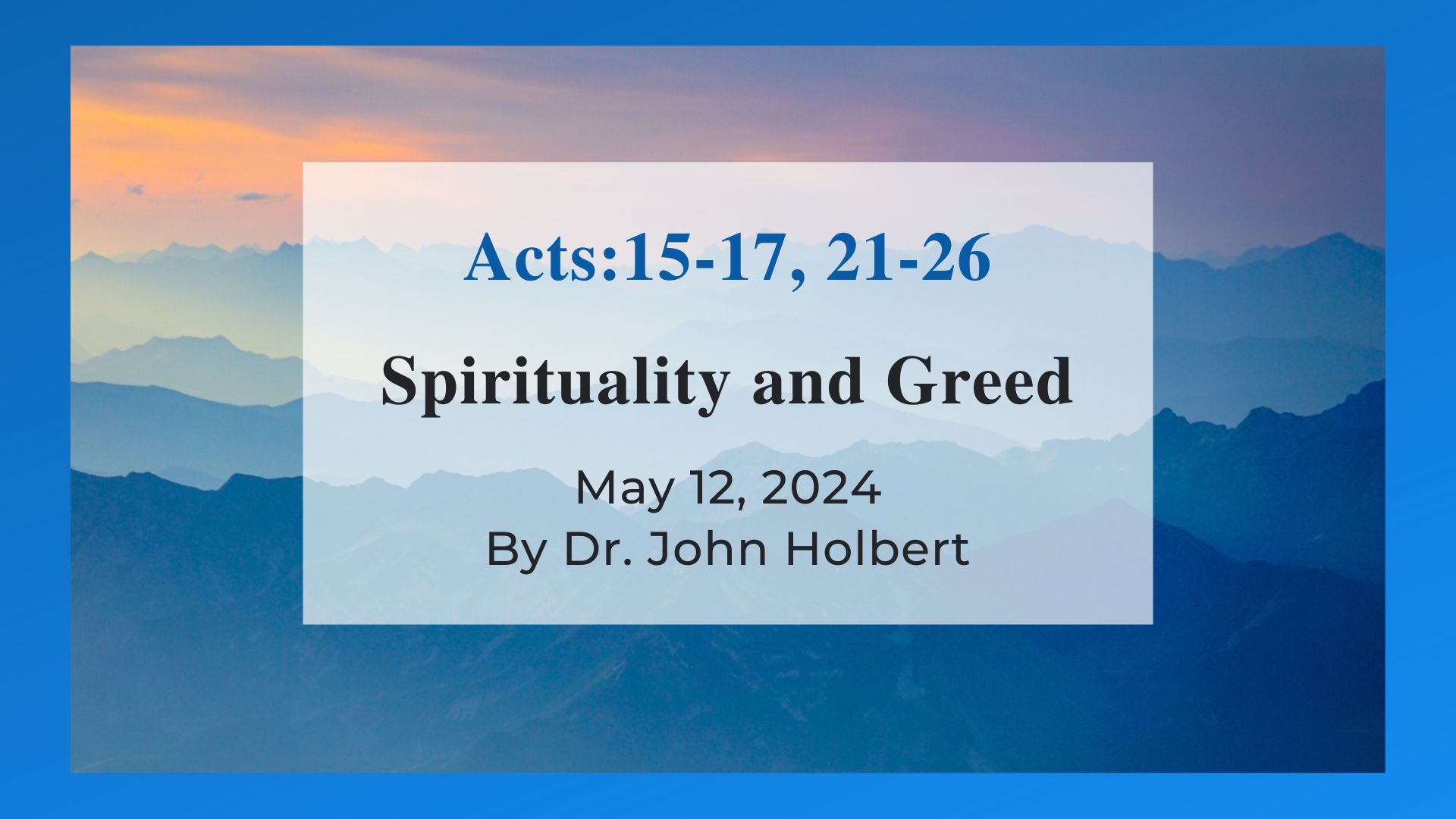Spirituality and Greed - Reflections on Acts:15-17, 21-26
by Dr. John Holbert on Monday, May 6, 2024

Spirituality and Greed
Acts:15-17, 21-26
The Peripatetic Hebrew Bible Preacher
Luke’s gospel was concerned to present many different aspects of the implications of the ministry of Jesus, but none was more significant than his concern with the dangers of money. From the Rich Ruler in the Gospel to the terrible fates of Ananias and Sapphira, Luke over and again warns of the lures of cash and property, lures that inexorably lead a would-follower away from the call of Jesus to service. Few problems of genuine discipleship are more difficult in any age than this one. “The love of money is the root of all evil,” claims James, and he apparently knows whereof he speaks. Surely, Luke would agree.
In the seemingly simple need to select another disciple to replace the fallen Judas, Luke spends a significant textual time, not to mention a superb literary artistry, on the task. He does so by shaping his own particular take on the betrayal of Judas to indicate his central claim about the lure of money, and the ways in which that lure suggests a spiritual disaffection matched by a very physical acquisitiveness. The reason for needing another disciple is of course to complete the fractured number of the necessary 12, reminiscent of that number of the initial 12 tribes of Israel, the historical model that served as the theologically correct group that indicated the restored people of Israel, the very heart of the people, now ready, in the new Christian community for the gift of the Holy Spirit (Acts 2). In that way the promise of God would have found its fulfillment. Judas, the craven traitor, simply had to be replaced.
But Luke gives the reader a special insight into the reasons for Judas’s betrayal. Unlike Matthew, who presents a repentant Judas, returning the “blood money” to the priests, and committing suicide by hanging, Luke presents a very different tale. The great differences between the two stories suggests clearly that Luke is employing here his literary skill to the full. Though Acts 1:18-20 is usually presented in modern translations in parentheses, suggesting that this portion is an aside, nevertheless the self-contained story of Judas’ horrific demise makes Luke’s point about the dangers of money all too real.
Judas, says Luke, “bought a field from the payment for his wicked deed. But he fell headlong. He burst open in the middle and all his bowels spilled out” (Acts 1:18). Matthew’s Judas may repent in a paroxysm of guilt, but not Luke’s. Judas takes his priestly money and “buys a field” with “the payment for his wicked deed.” This comment echoes Luke 16:9 and the “wicked mammon” of the parable of the wicked steward, the quintessential story of the foul consequences of the abuse of money. The purchase of property is a prefiguring of the failure of Ananias and Sapphira properly to dispose of their property and to give the proceeds to the apostles, a failure that leads to both of their deaths (Acts 5). In the same way, though in even more lurid terms, Luke describes the bloody demise of Judas; he falls, apparently from a great height, (no attempt to square this portrait with Matthew’s hanging Judas is satisfactory), with the result that he “bursts open and his bowels spill out.” This grisly picture reminds a careful Bible reader of the awful death of Amasa at the hands of Joab in 2 Samuel 20:10, not to mention the miserable end of Herod that Luke offers at Acts 12:23.
Judas’s spectacular death leads the place where it occurs to be named, in Aramaic, “field of blood,” the one detail Luke shares with Matthew. But for Luke Judas’s bloody end has a quite specific point; he has taken money, bought land, and instead of sharing the money with the Christian community, of which he was an obvious insider, he instead kept it for his own personal purchase and thereby ended his life in the most ghastly of ways. To make the horror even more appalling, Luke adds a citation from Ps.68:26 (LXX) with a few modifications to make the application to Judas more direct: he changes the pronouns of the psalm from plural to singular; “let his dwelling place become deserted” (Acts 1:20). Thus, the curse on Judas is extended even to his property!
Luke has here again emphasized the terrible dangers of money; the desire for it led Judas to betray Jesus, and his desire for personal property leads not to his comfortable retirement but rather to his horrifying death. Luke the preacher reminds his 1st century readers as well his 21st century readers that the love of money is a very dangerous thing and can lead to both a denial of true discipleship as well as, in extreme circumstances, a lonely and miserable death.
